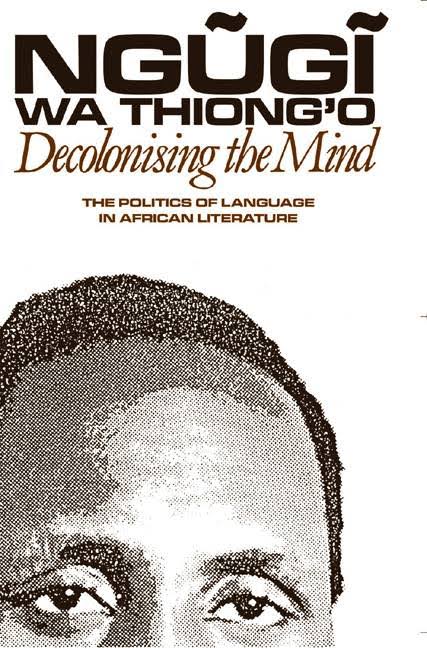
This classic was published in 1986 based on various lectures delivered by the writer in the early eighties. After 2015’s decolonisation project in South Africa initiated by RhodesMustFall, our reading group decided to make Decolonising the Mind our first read for 2016. to set the tone.
Ngugi Wa Thiong’o is famous for his decision in 1977 to abandon English as his medium of expression and turn to writing in his native Gikuyu or Swahili. This book illuminates his philosophies and how he arrived at this conclusion. In the introduction he says the themes in this book are inspired by Guyanese poet, Martin Carter’s famous lines, ’And so if you see me looking at your hands/listening when you speak/marching in your ranks you must know/I do not sleep to dream but dream to change the world…..’’
The book consists of four chapters, three of which respectively tackle different language issues as they relate to African Literature, African Theatre and African Fiction. This is brought together in the final chapter as The Quest for Relevance.
Decolonisation cannot be discussed without a re-examination of “imperialism in its colonial and neo-colonial forms”. His claim that “language has always been at the heart of the two contending social forces in the Africa of the twentieth century” cuts to the heart of the problem. We are still experiencing contestation around language issues in SA today; language can and does act as a barrier to knowledge and learning.
It is fascinating to read his concise history of the forces of colonialism as they relate to language from the perspective of an African .He contends that there is no such thing as African literature if written in English; this is Afro-European Literature; if it were African Literature it should be written in an African language. He also describes his personal history and how the harmony, symbolism and imagery inherent in his mother tongue was broken when he attended a colonial school and had to learn in English. If caught speaking in Gikuyu, the culprit received corporal punishment while the good use of English was rewarded by accolades and praise. A cruel and unsubtle approach!
Ngugi Wa Thiong’o asks this question, “by our continuing to write in foreign languages, paying homage to them, are we not on the cultural level continuing that neo-colonial slavish and cringing spirit?” There are difficulties as well as resistance from other African writers, there are economic considerations especially as the market for these books does not exist and is not spread across the world. Nevertheless, how can we say African readers will not read books in their mother tongue if they have never been given the opportunity?
In the chapter on theatre, the way he came to create a play, Ngaahika Ndeenda, acted in Gikuyu in a rural community, also highlights the many obstacles and how far the colonised people had moved from their oral roots that drew upon ceremony, ritual, fables and community. Song and dance was an integral part of society and this is incorporated in the play. It is wonderful to read about the community involvement in the development of the play – a workshopped creation that took on a life of its own.The play was very successful and drew audiences from far and wide but was banned by the government in November 1977. Ngugi was imprisoned in December 1977.
It was in prison that he wrote his first book in Gikuyu, later translated into English as Devil on the Cross. He was not allowed to have paper so he resorted to toilet paper; “…toilet paper at Kamiti was meant to punish prisoners.So it was very coarse. But what was bad for the body was good for the pen.” That is certainly making the best of a bad situation. He was soon to be confronted with the difficulties of writing in a tonal language, one in which the length of a vowel has a significant impact on the meaning; how to denote this in a language for which a satisfactory orthography had not been developed? In his solutions to this dilemma he draws on many different sources.
“Language, any language, has a dual character: it is both a means of communication and a carrier of culture”,
This too is highly relevant in SA today; at the recent Time of the Writer festival in Durban themed as Decolonising the Book, it was clear from numerous panel discussions that we need people to admire their own languages as much as they do English; we need more books written in African languages; we learnt of the fear that along with the language being devalued, so is the culture. For those who want to fully understand the current situation, this book should be prescribed reading.